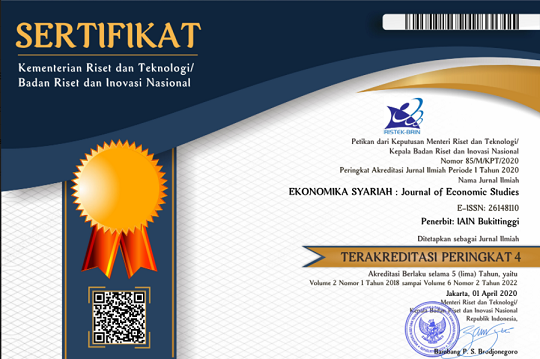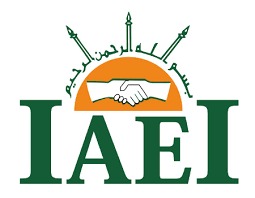ANANILSA PENERAPAN EKONOMI SYARIAH PADA UNIT USAHA BUMDes DALAM MENINGKATKAN EKONOMI MASYARAKAT DESA
DOI:
https://doi.org/10.30983/es.v2i2.725Abstract
The purpose of this Writing is to analyze the study of the Implementation of Sharia Values in the business of the Nagari-Owned Business Entity (BUMNag). The analytical method used in this study is the SWOT analysis. This study shows that the contracts that exist in Islamic economics can be applied to Business Units that may be formed by BUMNag in accordance with laws and regulations. In addition to having strength (the majority of the Muslim population and Nagari have Alim Ulama, have BUMNag and good development), and Opportunities (The development of Islamic economics and the National Sharia Council, the existence of the Law concerning Islamic economics), this concept also has shortcomings (lack of public understanding of sharia contracts, lack of academic staff in Nagari) and Threats (Overall Islamic economics cannot be applied in Indonesia and the development of conventional transactions in the community). To realize BUMNag based on an Islamic economic perspective, it requires an active role and joint commitment from the Nagari government, the community, religious scholars, the National Sharia Council, non-governmental organizations, and parties concerned about the development of BUMNag and the Islamic economy.
References
Cresswell,John.W,2010, ResearchDesign: Pendekatan Kualitatif, Kuantitatif dan Mixed, Yogyakarta : Pustaka Pelajar.
Moleong, Lexy.J , 2002, Metode penelitian Kualitatif ,Bandung, Remaja Rosda Karya.
Erani, Ahmad ,2008, Ekonomi Kelembagaan .Malang , Bayu media Publishing.
Antonio, Muhamad Syafii. 2009. Bank Syariah: Dari Teori Ke Praktek. Jakarta:
Gema Insani Press.
Dzikrulloh dan Eka Permata, A.R. 2016. Sinergitas Baitul Maal Wa Tamwil (BMT) Dengan Badan Usaha Milik Desa (BUMDES) Sebagai Alternatif
Farisi, Mohammad Imam. 2012. Pengembangan Asesmen Diri Siswa (Student Self-Assessment) sebagai Model Penilaian dan Pengembangan Karakter.Artikel disampaikan pada Konferensi Ilmiah Nasional “Asesmen dan Pembangunan Karakter Bangsa†HEPI UNESA 2012.
Undang - Undang Nomor 37 Tahun 2004 tentang Kepailitan dan Penundaan Kewajiban Pembayaran Utang (Lembaran NegaraRepublik Indonesia Tahun 2004 Nomor 131, Tambahan Lembaran Negara Republik Indonesia Nomor 4443);
Undang-Undang Nomor 1 Tahun 2013 tentang Lembaga Keuangan Mikro (Lembaran Negara Republik Indonesia Tahun 2013 Nomor 12, Tambahan Lembaran Negara Republik IndonesiaNomor 5394);
Undang - Undang Nomor 6 Tahun 2014 tentang Desa (Lembaran Negara Republik Indonesia Tahun 2014 Nomor 7, Tambahan Lembaran Negara Republik Indonesia Nomor 5495);
Peraturan Pemerintah Republik Indonesia Nomor 43 Tahun 2014 tentang Peraturan Pelaksanaan Undang- Undang Nomor 6 Tahun 2014 tentang Desa (Lembaran Negara Republik Indonesia Tahun 2014 Nomor 123, Tambahan Lembaran Negara Republik Indonesia Nomor 5539);
Peraturan Mentri Desa, Pembangunan Daerah Tertinggal, dan Transmigrasi Republik Indonesia No.04 tahun 2015, tentang Pendirian, Pengurusan dan Pengelolaan dan Pembubaran Badan Usaha Milik Desa ;
Frequently Asked Questions (FAQ) tentang BUM Desa (2016) Dirjend Pengembangan Usaha Ekonomi Desa (PUED) Dirjend Pembangunan dan Pemberdayaan Masyarakat Desa, Kementrian Desa, Pembangunan Daerah Tertinggal dan Transmigrasi,
Downloads
Submitted
Accepted
Published
Issue
Section
License
Authors who publish with this journal agree to the following terms:
- Authors retain copyright and grant the journal right of first publication with the work simultaneously licensed under a Creative Commons Attribution-ShareAlike 4.0 International License that allows others to share the work with an acknowledgment of the work's authorship and initial publication in this journal.
- Authors are able to enter into separate, additional contractual arrangements for the non-exclusive distribution of the journal's published version of the work (e.g., post it to an institutional repository or publish it in a book), with an acknowledgment of its initial publication in this journal.
- Authors are permitted and encouraged to post their work online (e.g., in institutional repositories or on their website) prior to and during the submission process, as it can lead to productive exchanges, as well as earlier and greater citation of published work (See The Effect of Open Access).













